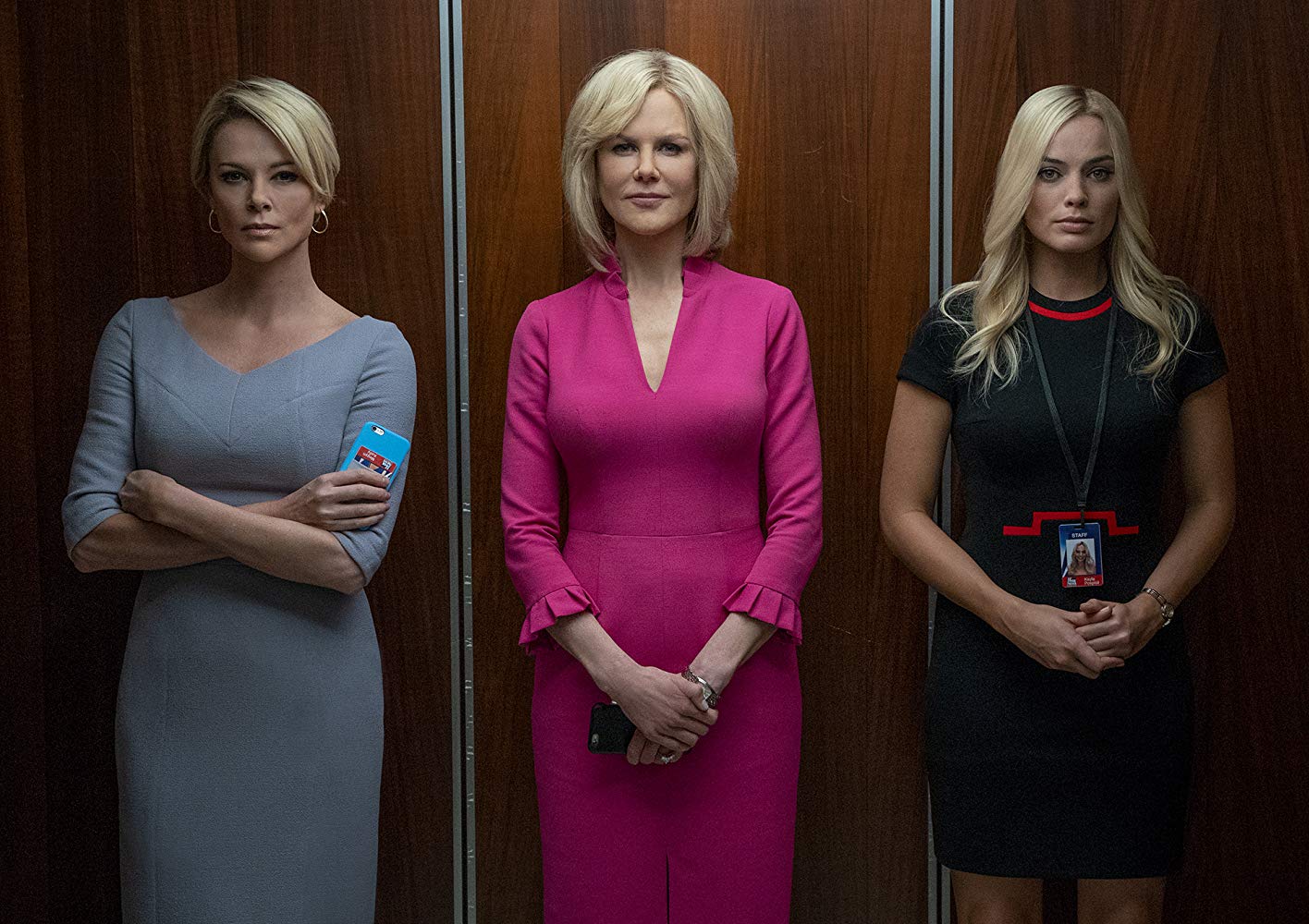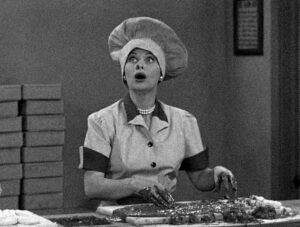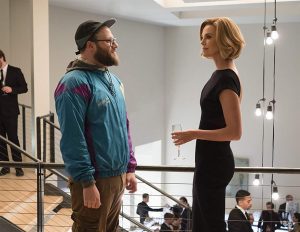As the elevator descends to the second floor, three women stand side by side, an eerie series of staccato notes being sung in the background. They face forward, arms clasped in front of them. This is the only scene the three leads of Bombshell share together, and barely a word is spoken.
Bombshell details the story of the sexual harassment allegations filed against former Fox News CEO Roger Ailes (John Lithgow) in 2016. The film follows three women, each at starkly different points in their careers at the news corporation: declining news anchor Gretchen Carlson (Nicole Kidman), prominent news personality Megyn Kelly (Charlize Theron), and up-and-comer Kayla Pospisil (Margot Robbie). The network finally fires Carlson after a series of demotions linked to her refusing Ailes’s advances during her tenure on Fox & Friends, which prompts her to file a sexual assault lawsuit against the CEO. Carlson waits in fear as the other two women assess whether or not to come forward against him.
Each of the three women must weigh her own career success against her moral conviction to speak out, a very real struggle for women seeking high-powered (or really any) jobs in inherently sexist industries. The viewer roots for Ailes’s demise as he perpetuates a toxic and deeply misogynistic workplace culture, but still understands why many women comply with his demands. “We benefited from that kind of attention,” Kelly remarks at one point in the film. Ailes’s attention is degrading, but comes with the promise of success—and a promise of absolute failure if any complaints are made.
In one of the most disturbing sequences of the film, an ambitious Kayla speaks with Ailes about becoming a news anchor. A wide-eyed, idealistic, Christian conservative who wants nothing but to perpetuate the Fox News mission on air, Kayla enters Ailes’s office hoping for a career-advancing conversation. She is instead met with something heinous. Implying that he wants to see if her legs will look good on TV, Ailes has Kayla lift her skirt higher and higher. On-screen, we see shots of Kayla’s horrified face as the hemline of her skirt approaches her underwear.
The protagonists lament the environment Ailes creates in his workspace: that one woman’s success means another’s failure. But this could not be less true of the three lead actresses, who each, in a movie that thrives on subtlety of performance, bring something truly remarkable to the table. Theron seamlessly steps into the role of Megyn Kelly, resembling the demeanor of the news personality in an almost uncanny way. Robbie shines as newcomer Kayla, delivering gut-wrenching performances in her most vulnerable moments. And Kidman, despite her reduced screen time as compared to the other two leads, packs a real punch as she awaits corroboration of her story. However, like the conditions of Ailes’s office, the three leading women rarely, if ever, are allowed to share the screen. The film pits their narratives against one another.
It’s therefore unsurprising that comradery between women—or rather, lack thereof—is a recurring theme. Kayla befriends co-worker Jess Carr (Kate McKinnon), a closeted gay liberal who works at Fox because it was her only job offer. Jess welcomes Kayla in, takes her out for drinks, and spills her secrets. But when Kayla approaches Jess about Ailes’s unwanted advances, Jess immediately shuts her down, stating it would be better for Kayla to not involve anyone else. It’s every woman for herself at the end of the day.
Exploring sexual harassment and standing up for women’s rights is a rather contradictory thing for a conservative network that perpetuates a degrading narrative on the daily, and Bombshell certainly acknowledges this. At points within the film, both Carlson and Kelly face backlash at work for daring to criticize society’s sexism on air. The film does not paint its leads as champions of feminism; they still ultimately believe in conservatism. But it refuses the idea that, just because women hold some right-wing views, they must subscribe to the entire manifesto of the Republican party. Ultimately, Bombshell separates issues of women’s rights from the rest of the conservative narrative: The women can be conservative but still hope to be treated with dignity and respect in the workplace. It is an interesting and nuanced political conversation, one that we rarely see as current political tactics focus more and more on issue linkage and generalization.
Bombshell certainly is not perfect; the film is unevenly paced and suffers from an abrupt tonal shift. The opening sequence of Megyn Kelly giving the low-down at the Fox News headquarters directly to the audience is reminiscent of the humorous tone of Vice (2018), but this narration style quickly ends as the movie jumps to its serious subject matter. It is a political drama that attempts to layer in some comedy in its early and more light-hearted moments, a choice that feels abrupt and rather confusing. And though on-screen captions help, the quick time-jump from Kelly’s 2015 Twitter feud with Donald Trump to the 2016 lawsuit was not as seamless as the film believes. But despite some flubs in sequencing, the performances, storytelling, and thematic messaging truly make this film excel.
Bombshell is not the story of any one person. It is not the story of Megyn Kelly, though Theron easily steals the show with her stellar performance. It is not the story of young Kayla, despite her having the most explicit on-screen sexual harassment sequence of the film. It is not the story of Carlson, who finds herself with a lack of screen time after filing the initial lawsuit. It certainly isn’t the story of Ailes. Rather, Bombshell is a film that explores the culture surrounding sexual assault in an environment where it is so normalized, and that explores the ramifications of speaking out on women that hope to succeed within it.
“Will I be defined by this for the rest of my life?” the movie questions as Kelly finally comes forward against Ailes, cementing both his demise and her place as a part of this moment. Her testimony serves as the nail in the coffin for Ailes’s career at Fox News, as he is immediately and gracelessly ousted from his position as CEO. The end result is not happy. The movie doesn’t end in sunshine and rainbows, or justice for any of the women. But it closes with perhaps its most important message, the ultimate conclusion of the three women who spoke out: “I don’t care if you like me, only if you believe me.”
Photo Source: IMDb





